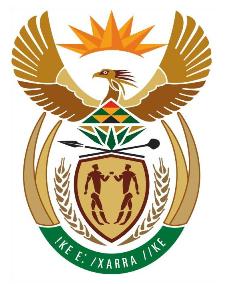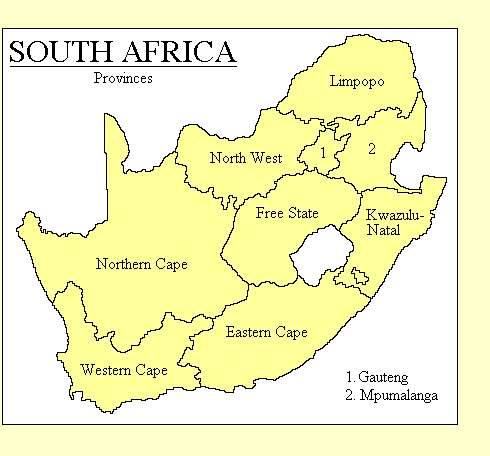

REPUBLIC OF
SOUTH AFRICA
• Official name: Republic of South Africa (Since South Africa has
11 official languages, the country has 11 official names. The English
form is most widely used.)
• Location: Southern Africa
• International organisations: African, Caribbean and Pacific Group of States, African Union,
Group of Twenty, Non-Aligned Movement, United Nations, World Trade Organisation
• Borders: Botswana, Lesotho, Mozambique, Namibia, Swaziland, Zimbabwe
• Coastline: Indian Ocean, South Atlantic Ocean
• Land area: 1,219,912 Km2
• Population: 49,300,000
• Annual GDP (PPP) per capita: US$10,100 (2009 CIA estimate). World ranking: 84
• Ethnicity: About 74% of South Africans are of black African
descent. The largest ethnic groups are the Zulu
(19%), Xhosa (15%), Pedi (8%), Tswana (6%), Sotho (6%), Tsonga (4%),
Swazi (2%) and Venda (1%) peoples. About 14% of the population are of
European descent, these being mainly Afrikaaners (of Dutch descent)
(8%) and English (6%). About 9% of the population describe themselves
as Coloured, meaning of mixed African, European and/or East Asian
descent. About 3% of the population is of Indian descent.
• Languages: South Africa has 11 official languages: Afrikaans,
English, Ndebele, Pedi, Sotho, Swazi, Tsonga, Tswana, Venda, Xhosa and
Zulu. In practice English is the language of government and business.
Most of the African population speak an African language plus
Afrikaans or English or both. The Coloured population mainly
speak Afrikaans.
• Religion: Christian 68% (includes most whites and Coloureds,
about 60% of Africans and about 40% of Indians), Muslim 2%,
Hindu 1.5% (60% of Indians), indigenous beliefs and animist 28.5%.
• Form of government: Federal presidential democratic republic. South
Africa is divided into nine provinces which have elected legislatures
and considerable autonomy.

• Capital: Pretoria. The Parliament sits at Cape Town.
• Constitution: The Constitution of
South Africa came into effect on 3 February 1997.
• Head of state: South Africa
is unusual in having an executive President who is not directly
elected. The President is elected by the National Assembly for a
five-year term.
• Head of government: The President, who appoints the members of
the Cabinet.
• Legislature: South Africa has a bicameral legislature. The
Parliament consists of the National
Assembly, which has 400 members, elected for five-year terms by proportional
representation, and the National Council of Provinces, which has 90 members,
elected for five-year terms by the provincial parliaments.
• Electoral authority: The
Independent Electoral Commission administers national and provincial elections.
• Freedom House 2011 rating: Political Rights 2, Civil Liberties 2
• Transparency International Corruption Index: 45% (54 of 178 countries rated)
• Reporters Without Borders Press Freedom 2010 Index: 86% (38 of 178 countries rated)
• Heritage Foundation Economic Freedom 2010 Index: 62.7% (74 of 179 countries rated)
Political history
The Dutch founded a colony at the Cape in 1652. In 1795 it was seized by the
British, and was permanently ceded to Britain in 1814. The Dutch settler population
was undisturbed, although British settlement soon began in the Cape and at Natal. White
settlers were always a small minority of the total population. Workers were imported
from the Dutch East Indies (Indonesia) and their descendents, intermarried with both whites and
Africans, became the Cape Coloured population. In the 1830s
some of the Dutch, now known as Afrikaaners, moved inland and founded the Orange
Free State and the Transvaal as independent Afrikaaner republics, ruling over the
African populations as feudal landlords.

During the 19th century the British introduced elected assemblies and
responsible government in the Cape and Natal. Africans and Coloureds who met property
or educational franchise requirements could vote (this was known as the Cape Franchise).
The Afrikaaners, however, refused to acknowledge that the African population had any
civic rights.
In 1867 diamonds were discovered in the interior, and in 1886 the world's
largest gold deposits were found on the Witwatersrand in Transvaal. This produced a
huge influx of immigrants, mostly English-speaking, to the Afrikaaner republics. When
they were refused voting and other rights, hostilities developed which led to the
South African or "Boer" War of 1899-1902.
The defeated Afrikaaners were reconciled to British rule by the granting of
self-government in 1907 and the formation of the Union of South Africa in 1910, with a
Union Parliament elected by white voters, and electoral arrangements which guaranteed
an Afrikaaner majority in the Parliament. Those Africans and Coloureds who already had
the Cape Franchise retained the right to vote, but it was not extended to any others.
In 1948 the Nationalist Party came to power on a platform of Afrikaaner
nationalism and white supremacy in all things. South Africa became a republic and left
the Commonwalth of Nations. All non-whites were deprived of the vote and political
rights, and strict segregation was imposed. Many South Africans of all races opposed
this policy of Apartheid (separateness), and the regime responded with increasingly
authoritarian measures. In 1978 the parliamentary system was replaced with a system
vesting executive authority in a President elected by the legislature.
The African National Congress was founded in 1912 to represent African
political aspirations. Despite its commitment to non-violent opposition, it was
banned in 1961, and thereafter waged an underground resistance campaign. Its leaders,
including Nelson Mandela, were imprisoned. From the 1960s international opinion
increasingly condemned Apartheid, and economic and cultural sanctions were applied. This
eventually demoralised most of the white population.
In 1989 Frederick de Klerk became President and announced that Apartheid must
end. Mandela was released and all political parties legalised. The segregationist laws
were abolished. After prolonged negotiation, a political settlement was reached that
saw free elections held in 1994, after which Mandela was elected President. Apart from
a few diehards, the white population has adapted to African majority rule.
The African National Congress is the
overwhelmingly dominant political force in democratic South Africa, polling around
two-thirds of the vote at four successive national elections. The ANC is in theory a socialist party,
and the South African Communist Party is
affiliated with it, but in office it has followed free-market policies. The only
other important party among the African population is the Zulu nationalist
Inkatha Freedom Party, although even this is a
declining force. A breakaway from the ANC, the
Congress of the People, has failed to make much
impact. The Nationalist Party fell apart after the first free elections. It
has been replaced as the voice of the white and Coloured voters by the
Democratic Alliance, led by Helen Zille.
Nelson Mandela, by now a univerally revered figure, retired in 1999 and was succeeded by
Thabo Mbeki, a dour marxist who was never happy with the free-market policies the ANC
government was forced by necessity to follow. Mbeki did great damage by refusing to accept the
realities of the AIDS epidemic - as a result South Africa has one of the highest rates of HIV
infection in the world. Mbeki was forced by the ANC leadership to resign in September 2008. He
was succeeded as ANC leader by
Jacob Zuma, a more congenial figure although one whose
reputation has been tarnished by allegations of corruption. Nevertheless the ANC polled 66% of the
vote at the April 2009 elections, and also controls all but one of the country's provincial governments.
Freedom House's 2011
report on South Africa
says: "South Africa is an electoral democracy... The ANC, which has won supermajorities in every democratic election,
dominates the political landscape. The DA is the leading opposition party, followed by COPE and the IFP. The electoral
process is generally free and fair, although the state-owned South African Broadcasting Corporation (SABC) has been
accused of pro-ANC bias. Political violence, while never severe, increased in the run-up to the 2009 elections...
Several agencies are tasked with combating corruption, but enforcement is inadequate...
Freedoms of expression and the press are protected in the constitution and generally respected in practice...
The government is sensitive to media criticism and has increasingly encroached on the editorial independence of the SABC...
Freedoms of association and peaceful assembly are secured by the constitution. South Africa hosts a vibrant civil society
and an embedded protest culture... South Africans are free to form, join, and participate in independent trade unions...
Judicial independence is guaranteed by the constitution, and the courts - particularly the Constitutional Court and the
Supreme Court - operate with substantial autonomy. Nevertheless, judicial and prosecutorial independence has come under
pressure in recent years amid the Zuma corruption cases."
Updated November 2011
|

